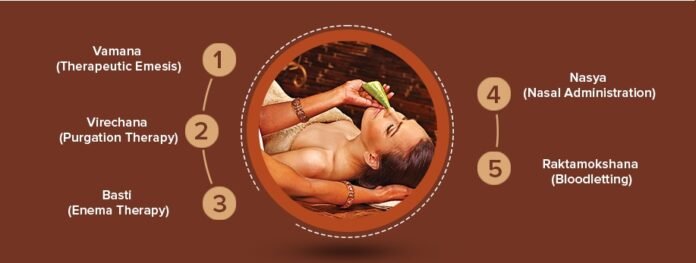Panchkarma, an ancient Ayurvedic detoxification and rejuvenation therapy, offers profound benefits for liver health. This comprehensive treatment aims to cleanse the body of toxins, balance the doshas, and restore overall vitality. If you are seeking a natural and effective approach to enhance liver function, Panchkarma therapy can be a transformative experience. In this guide, we will explore the benefits of Panchkarma therapy for liver health, outline the procedures involved, and provide tips to ensure your success with this holistic treatment.
Understanding Panchkarma Therapy
Panchkarma, meaning “five actions” in Sanskrit, is a therapeutic approach rooted in Ayurveda, the traditional system of medicine from India. It encompasses five primary treatments designed to detoxify and rejuvenate the body. These treatments are:
- Vamana (Emesis Therapy)
- Virechana (Purgation Therapy)
- Basti (Enema Therapy)
- Raktamokshana (Bloodletting)
- Nasya (Nasal Administration)
Each of these therapies targets different aspects of health and works synergistically to eliminate toxins and restore balance.
The Importance of Liver Health
The liver plays a crucial role in detoxification, metabolism, and digestion. It processes nutrients, produces bile, and helps filter toxins from the blood. A compromised liver can lead to a range of health issues, including liver cirrhosis, fatty liver disease, and poor digestion.
To support liver health, Ayurvedic treatments such as Panchkarma are highly recommended. By focusing on detoxification and balance, Panchkarma can help maintain liver function and overall well-being.
Benefits of Panchkarma Therapy for Liver Health
Panchkarma therapy offers several benefits for liver health, which include:
1. Detoxification
Panchkarma therapy aids in removing accumulated toxins (ama) from the liver and the entire body. This detoxification process helps reduce the burden on the liver and enhances its ability to function optimally.
2. Improved Digestion
By balancing the digestive fire (Agni), Panchkarma therapy can improve digestion and metabolism. This is crucial for the liver, as efficient digestion reduces the load of toxins that the liver must process.
3. Liver Regeneration
The therapies involved in Panchkarma support liver regeneration and repair. Procedures such as Basti (Enema Therapy) and Virechana (Purgation Therapy) can help rejuvenate liver cells and promote healthy liver function.
4. Balancing Doshas
Panchkarma aims to balance the three doshas—Vata, Pitta, and Kapha—within the body. An imbalance in these doshas can negatively impact liver health. By restoring equilibrium, Panchkarma helps maintain a healthy liver and overall balance.
5. Enhanced Vitality
Detoxification and rejuvenation through Panchkarma therapy can lead to increased energy levels and improved overall vitality. A healthy liver contributes to a stronger immune system and better overall health.
Panchkarma Procedures for Liver Health
The Panchkarma process involves several stages, each designed to prepare the body for detoxification and enhance the effectiveness of the treatments. Here’s a closer look at the key procedures:
1. Pre-Treatment Preparations
Before starting Panchkarma, individuals undergo a preparation phase that includes dietary changes and specific herbal therapies. This stage is crucial for preparing the body to effectively eliminate toxins.
2. Vamana (Emesis Therapy)
Vamana involves therapeutic vomiting induced by specific herbal medicines. This procedure helps expel toxins from the upper digestive tract and is beneficial for reducing Pitta dosha imbalances, which can affect liver health.
3. Virechana (Purgation Therapy)
Virechana is a cleansing technique that involves the administration of herbal laxatives to induce purgation. It helps eliminate toxins from the liver and digestive tract, improving overall liver function.
4. Basti (Enema Therapy)
Basti involves the introduction of medicated oils or decoctions into the rectum. This therapy helps in cleansing the colon and balancing the doshas, which can have a significant impact on liver health and overall detoxification.
5. Raktamokshana (Bloodletting)
Raktamokshana is a procedure used to detoxify the blood by removing impurities. Although not always included in every Panchkarma regimen, it can be beneficial for individuals with specific blood-related issues affecting liver health.
6. Nasya (Nasal Administration)
Nasya involves the administration of medicated oils or powders through the nasal passages. This therapy helps clear sinus and respiratory passages, indirectly benefiting liver function by enhancing overall detoxification.
Tips for Success with Panchkarma Therapy
To ensure the best results from your Panchkarma therapy, consider the following tips:
1. Choose a Qualified Practitioner
Select a reputable Ayurvedic clinic with experienced practitioners who specialize in Panchkarma therapy. Ensure that they are certified and have a strong track record in providing effective treatments. For a trusted provider, Keraliya Ayurveda offers comprehensive Panchkarma therapies tailored to your needs.
2. Follow Pre-Treatment Guidelines
Adhere to the pre-treatment guidelines provided by your Ayurvedic practitioner. This may include dietary changes and specific herbal preparations to prepare your body for the therapy.
3. Maintain a Balanced Diet
During and after Panchkarma therapy, maintain a balanced diet that supports liver health. Avoid heavy, oily, and processed foods, and focus on consuming fresh fruits, vegetables, and whole grains.
4. Stay Hydrated
Drinking plenty of water is essential to support the detoxification process and help flush out toxins. Ensure you stay well-hydrated throughout the therapy and beyond.
5. Follow Post-Treatment Care
After completing Panchkarma therapy, follow the post-treatment care instructions provided by your practitioner. This may include specific dietary recommendations and lifestyle changes to maintain the benefits of the therapy.
6. Explore Additional Treatments
For those dealing with specific conditions such as liver cirrhosis, consider exploring Ayurveda for liver cirrhosis as a complementary approach to support overall liver health and well-being.
Conclusion
Panchkarma therapy offers a holistic approach to revitalizing liver health through detoxification and rejuvenation. By understanding the benefits and procedures involved, you can make informed decisions to enhance your liver function and overall vitality. With proper guidance and adherence to treatment protocols, Panchkarma can be a powerful tool in supporting and restoring liver health.
For personalized Panchkarma therapy and expert Ayurvedic care, visit Keraliya Ayurveda. Embrace the transformative potential of this ancient healing practice and experience renewed health and well-being.



